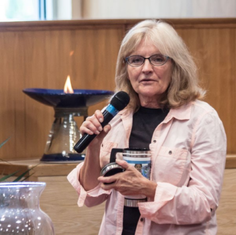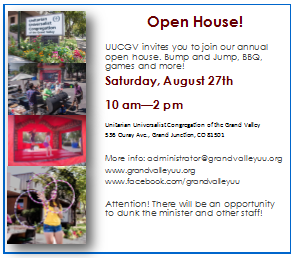 Sunday, September 11 is our annual Ingathering/Water Communion. You are welcome to bring a small amount of water to the service, taken from special places you have been over the summer, or that is otherwise significant or symbolic in some way. We will pour the water into one container, tell the congregation where it is from and the meaning it has for you, and join it with water from years past.  This is a monthly column helping us to get to know our friends and members in a deeper way. We thank Monte High for taking the time to do these in-depth interviews for us every month. As she was in the beginning (of time), is now, and forever shall be. Muse over all the begetting and circumstance, the improbable possibility. She was, she is, she shall be the twinkle in her parents eyes. Her father Jim, her mother Kathie, meeting on a blind date – a sparkle that is the precious jewel Elizabeth High, becoming. Elizabeth was born beneath the Flatirons in Boulder, Colorado. She was born on a New Moon (the phase of the moon when it is in conjunction with the sun) on the first day of the Lunar New Year, 1973, the year of the ox. She is (in accordance with pseudo-Chinese lore) a stabilizing force that perpetuates the cycle of life. She stands immobile against the test of adversity. She seeks to serve integrity. Elizabeth’s childhood was full of music. She began taking piano lessons at age 5 and flute lessons in fifth grade. She played flute in the junior high and high school orchestra. The Dewey family – Kathie and Jim, Elizabeth and her older brother Nick – spent many weekends exploring the Colorado high country, backpacking trips in the summer and cross-country skiing in the winter. In the spring of 1979, when Elizabeth was in kindergarten, the Dewey family visited the Soviet Union for about two months. Jim worked for the US Geological Survey. The trip was conducted as part of a scientific exchange on earthquake studies, yet they were able to get in a good bit of sightseeing. The Soviet trip roused in Kathie a passion for Russian culture that lasted her entire life. Kathie poured over Russian literature, attended classes at the University of Colorado, and engaged with the local Russian immigrant community. She was involved in the Boulder-Dushanbe Sister City project, which helped establish the landmark teahouse that was gifted by Dushanbe. The teahouse was disassembled piece by piece in Dushanbe and then reassembled in downtown Boulder. Dushanbe, Tajikistan was one of the places the Dewey family visited on their trip to the USSR. Elizabeth attended Grinnell College. At first she didn’t know what she wanted to study. She discovered that the Russian studies professors were extraordinary. She loved to study languages, even though the pronunciation of foreign languages is difficult for her. And, she found out that Russian majors also studied Russian history and literature. What decision was there to make, really? Elizabeth also played flute in the Grinnell orchestra and performed a senior flute recital. After a 2 ½ year struggle with ovarian cancer, during Elizabeth’s sophomore year at Grinnell, her mother, Kathie, passed away while Elizabeth was home for Thanksgiving break. Kathie was much beloved. Her death sent waves of pain surging through the Dewey family. (Jim later married a wonderfully kind, loving and inspiring woman – Selena – who has been a blessing to the family.) In 1993 Elizabeth ventured to Krasnodar Russia for a semester abroad, and in 1994 to St. Petersburg, Russia for a summer internship at a seed bank. After Grinnell, Elizabeth worked for a year at a plant nursery while taking botany classes at CU. In 1996 she went on to work at a supported-employment service for adults with developmental disabilities, where she first considered a career in occupational therapy. Elizabeth took night classes at Front Range Community College for two years while working full time, in order to get her prerequisites for OT school. In 2001 she took the short trip north to Fort Collins to attend the occupational therapy graduate school at Colorado State University. Despite the demanding curriculum, Elizabeth began to notice a prodigiously peculiar man gliding around her periphery. His feet seldom touched the ground. One day, out of the blue, she tripped and fell flat-on-her-face in love with him. In 2003 Elizabeth Dewey put on her walking shoes. She walked through graduation and walked down The Aisle to become Elizabeth High. In 2005 the Highs headed up, up and over the continental divide and gravitated into the Grand Valley. A while later they found the UUCGV and Grand Junction began to feel more like home. Elizabeth works as a home health occupational therapist for Home Care of the Grand Valley. She finds her job challenging, yet she finds many rewards. Elizabeth feels a meaningful connection to the UUCGV community, which in turn helps her to feel more connected to the community at large, the universe and beyond. Her spiritual community helps to keep her awake and aware. Her daily spiritual practice drives a deeper connection. Elizabeth practices the teachings of Eknath Easwaran, through the Blue Mountain Center of Meditation – an eight point program of daily meditation and mindfulness training. Let Elizabeth be; let her be what she is becoming. Life goes on... In endless song... [If you want to feel more connected to the UUCGV community – check out the covenant groups that are starting up in September – led by Elizabeth High and Martha House.] Yes on T During the election this November you will notice a ballot measure called No Exception to Involuntary Servitude Prohibition Amendment. It will appear as Amendment T. As the Unitarian Universalist ministers in Colorado, we urge you to vote YES on this measure. We know that slavery is not a Colorado value. But for more than a century our state constitution has preserved the right of the state to enslave people as punishment for a crime. This archaic and hurtful language must be removed. You may be asking yourself, what impact might this have on people who are currently incarcerated? The measure will not end prison terms as punishment for crimes committed in our state, but it will help us move forward the conversation about what justice truly looks like in our communities. There are many conversations to be had about what justice looks like, but we believe that we can all agree, that no matter what conclusion we come to about the appropriate measures to address crimes, our response should never include slavery. As Unitarian Universalists we hold dear our heritage of abolitionists who fought to end slavery in the 19th century. Ministers like Theodore Parker who is reputed to have kept a pistol in his desk to protect runaway slaves. We are called to continue his heroic work by standing against slavery today. We believe that by changing the way we talk about what prison is, and why people are there, we can begin to change the conversations and outcomes and move toward right relationship in our communities. The measure would amend Section 26 of Article II of the Colorado Constitution. The following struck-through text would be deleted- Amending Section 26 of Article II Section 26. Slavery prohibited. There shall never be in this state either slavery or involuntary servitude except as a punishment for crime, whereof the party shall have been duly convicted. Yours in faith, Rev. Keith Arnold, Jefferson Unitarian Church; Rev. Eric Banner, Jefferson Unitarian Church; Rev. Barry Bloom, Unitarian Universalist Church of Greeley; Rev. Kelly Dignan, Unitarian Universalist Church of Boulder; Rev. Lydia Ferrante-Roseberry, Boulder Valley Unitarian Universalist Fellowship; Rev. Shawna Foster, Two Rivers Unitarian Universalist; Rev. Gretchen Haley, Foothills Unitarian Church; Rev. Jann Halloran, Prairie Unitarian Universalist Church; Rev. Wendy Jones, Unitarian Universalist Congregation of the Grand Valley; Rev. Katie Kandarian, Unitarian Universalist Fellowship of Durango; Rev. Laurel Liefert, Namaqua Unitarian Universalist Congregation; Rev. Dana Lightsey, High Plains Church, Unitarian Universalist; Rev Julia McKay, Columbine Unitarian Universalist Church; Rev. Mike Morran, First Unitarian Society of Denver; Sean Neil-Barron, Assistant Minister, Foothills Unitarian Church; Aaron Norris, Ministerial Resident, First Universalist Church of Denver; Rev. Nori Rost, All Souls Unitarian Universalist Church; Rev. Jeannie Shero, First Universalist Church of Denver; Rev. Wendy Williams, Jefferson Unitarian Church  This is a monthly column helping us to get to know our friends and members in a deeper way. We thank Monte High for taking the time to do these in-depth interviews for us every month. Kathleen Hedlund currently finds herself cycling through another major life change. She navigated the labyrinth from birth through childhood and adolescence, and into adulthood. Then, when Kathleen had come to believe that it would be just her and Jeremy growing old together – conception. At the age of 42 Kathleen became a mother. Into the world came Julian, the thoughtful one. [Over the years, many of us were fortunate to see Julian grow up within the congregation. We witnessed the bridging ceremony, and heard him speak with wisdom beyond his years.] When Julian was born Kathleen found herself again experiencing birth, childhood, and adolescence. And then burgeoning adulthood – which brings her around to her current state – seeking to reinvent herself. Sifting through various colors of yarn to weave into her spacious nest. Kathleen came into being in Berkeley California. Her sister says that’s proof that she’s hippie all the way. She spent most of her formative years in a rural area North East of the Bay; although, she lived in Southern California for five of her growing-up years, where she learned to love the desert and the ocean. She loved the water, and one of her favorite childhood memories is of bobbing in the ocean, waiting for a wave. Kathleen went to college at UC Davis. She wanted to go to Berkeley, but her parents thought it was too dangerous. The joke amongst her peers was that Davis was the school to go study cows. What she remembers most about Davis is the joy of riding her bike everywhere. She graduated with a psychology degree in 1975. After graduation, Kathleen’s Grandma took her on a two week trip to her home country of Sweden, introducing Kathleen to her roots. Kathleen would later repeat this voyage with Julian. Time to get a job. Kathleen liked the idea of moving east to live near her relatives in Northern Virginia. She assumed that she would work for the government in some capacity, but ended up working in a shirt & tie shop owned by a New York family. It was a wonderful culture shock to be a part of that family culture and the culture of downtown DC. It seemed to Kathleen that the family argued about everything before they could agree on anything. And she met and befriended people from many different cultures. The shop was just up Connecticut Avenue from the White House. They made custom formal shirts for a clientele that ranged from Senators and business tycoons, to pimps. It was an exciting place to be. Yet, always, tugging at Kathleen’s sleeve – a strong desire to help people. She started working at an institution for the mentally handicapped. She began taking sign language classes at Gallaudet University. Kathleen plotted to become a sign language interpreter. She found a school for interpreter training on Colorado’s Eastern Slope. She stepped into the whirlwind and headed west. Kathleen eventually discovered that she simply liked to talk too much. She thought maybe it would suit her better to use her hands for touching, for healing. Kathleen enrolled in nursing school at Auraria College in Denver. While Kathleen was living in downtown Denver, attending nursing school and working as a house counselor for transitioning mentally handicapped women, she met Jeremy. After graduation, she clasped his hand and the whirlwind set them down in Grand Junction. Kathleen’s core desire is compassion. She is digging a well of empathy. She has been practicing these qualities as a nurse at St. Mary’s hospital for 30 years. Every day she continues to learn from her patients, their families, and her coworkers. When Julian began to grow into his curiosity and ask significant questions about the world, Kathleen began searching for a religious community. She wanted a community that would foster spiritual growth. The Unitarian Universalists were a good fit. She liked the Religious Education and Our Whole Lives (OWL) programs. Julian benefited greatly. It seemed like a natural transition to start giving her time as a teacher. Kathleen has been teaching religious education and middle school Our Whole Lives (OWL) for many years. When she first dipped her toes into the waters of teaching, the Valley’s Unitarian home was still called the Uncompahgre Unitarian Universalist Society. Kathleen is grateful that she found the Unitarian Universalist Congregation of the Grand Valley. She is grateful for the Services and programs that she takes in, and she is grateful for all that she learns from the children while teaching RE and OWL. She says she thoroughly believes the UU tenet that “through continually learning and growing together we encourage and support one another, and our children, to know and express our moral agency”.* (uua.org/re) Planned Giving Planned Giving gifts are essential to a strong financial future for church organizations. There are many different methods of making planned gifts, many with income tax advantages or guaranteed income streams, or ease of disposing of tangible assets. Each month we will present a different method for doing planned giving to a charitable organization. One simple way for an individual to leave a gift to a charitable organization is to direct the proceeds of a life insurance policy to the organization. The original intention of the insurance policy is often to help meet the financial needs of the family if the policyholder dies prematurely. As often happens later in life, family members may become more financially secure and less dependent on “crisis” funds. Also, the family members may inherit other assets such as real estate, stocks, bonds, heirlooms etc. from the deceased’s total estate. Making a charitable organization, like UUCGV, a beneficiary or co-beneficiary, of life insurance gives some, or all, of the death proceeds to the organization when the donor dies. The donor can control precisely how the proceeds are to be split up among beneficiaries. Changing or adding a beneficiary requires obtaining a simple form from the insurance company, describing the details on how the proceeds are to be split, and then signing the form. Besides the death benefit, some “permanent” forms of life insurance policies have redeemable cash values that are built up over the years, say $12,000 on a $100,000 policy. The policyholder can assign the ownership of the old policy to UUCGV. The policyholder gets an income tax deduction for the immediate $12,000 cash donation given to UUCGV. If the policyholder continues to make premium payments to keep the policy building more cash value (and maintaining the death benefit) those premium payments are also income tax deductible each year. Assigning ownership just requires obtaining and signing proper forms from the insurance company/agent. Disclaimer: the information above is not intended to be technical advice. Individuals should always discuss such matters with their insurance agent, financial advisor or attorney before taking action. |
Archives
June 2023
Categories
All
|
|
|


 RSS Feed
RSS Feed